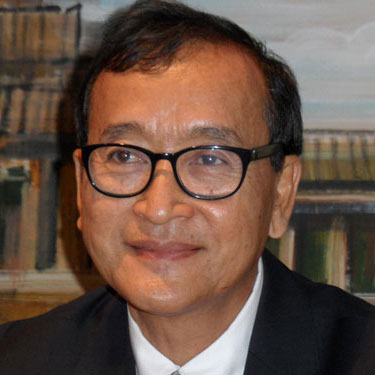The violent crackdown against pro-democracy protestors in Hong Kong is a tragedy in its own right and a warning of the dangers that await Cambodia unless it returns to the path of peaceful democracy.
As part of the ongoing anti-democratic crackdown in Hong Kong, a mob of men on July 21 attacked protestors at a train station in the north of the city, with democratic lawmakers saying that the slow police response time was evidence of collusion between the gangs and police.
The protests in Hong Kong were triggered by a bill, now suspended, that would have allowed extraditions to mainland China. Under its handover agreement with Britain in 1997, China agreed to allow freedom of speech in Hong Kong. Yet pro-democracy leaders have been jailed or disqualified from running for office. That backsliding shows the need for international action to protect agreed democratic rights. The scorn shown by the Cambodian government for the 1991 Paris Peace Agreement, which lays down a system of pluralist democracy for Cambodia, may have emboldened China to disregard its obligations in Hong Kong.
Faced with a Communist China that seeks to impose its vision of society on numerous poor and corrupt countries, the people of Hong Kong are not fighting simply for their own freedom, but for that of all those who refuse the dictatorship of guns and money as conceived by Xi Jinping. Cambodia’s democrats wish to express their support and admiration for the people of Hong Kong.
The Hong Kong authorities have been borrowing from the well-established use of sanctioned plain-clothes violence against democracy protestors in Cambodia. As long ago as 1998, groups of pro-government thugs were being used to beat up and shoot democracy protestors in Phnom Penh. In 2015, elected opposition Cambodia National Rescue Part (CRNP) lawmakers Nhay Chamroeun and Kong Saphea were beaten up outside the National Assembly. At a court appearance by land rights activist Tep Vanny in 2017, protestors who turned out in her support were chased and beaten by men in helmets.
Scared of democracy
If Cambodia’s history under Prime Minister Hun Sen teaches us anything, it is that the demand of the population to determine their own future cannot be abolished by diktat underwritten by the use of violence. The opposition Cambodia National Rescue Party (CNRP) scored close to half the votes both in 2013, the only national election that it was allowed to contest, and again in local elections in 2017.
Those results reflect only the level of CNRP popularity that the government was prepared to admit to. A leaked opinion poll in 2016 showed that the CNRP’s popularity was in fact higher than that of the ruling Cambodia People’s Party (CPP), with 44% of people saying they would vote for the CNRP in a national election versus 35% for the CPP. The poll’s findings led to the arbitrary dissolution of the CNRP in 2017 and the arrest of its leader, Kem Sokha.
This set the scene for rigged elections in July 2018, with all of the seats in the National Assembly being won by the ruling CPP. Kem Sokha, who spent a year in prison, remains under house arrest without trial.
Weapons to fight who?
Due to this dismal disregard for democracy and human rights, Cambodia’s export-dependent economy already risks the loss of duty-free access to markets in the European Union. Hun Sen responded by saying the opposition should be crushed. In July, Hun Sen said he would spend a further $40 million on buying arms from China, in addition to the $290 million already spent.
This can’t be justified while Cambodia remains one of the world’s poorest countries which faces no external threat. Political repression against the population is the only possible use for the weapons.
Hun Sen has done everything he can to curry favour with China, including agreeing to allow a Chinese military base in Cambodia in violation of our national constitution. Yet Hong Kong represents a much more direct threat to China’s interests than Cambodia ever could. China is pragmatic and seeks compliant client regimes wherever it can find them. Beijing supported the Khmer Rouge in Cambodia in the 1970s, but saw no reason to intervene to extend the life of the regime. In Chinese eyes, Hun Sen is much more expendable than he seems to realise.
The potential for violence in Cambodia dwarfs that witnessed in Hong Kong. Seeking to neuter the opposition by a mixture of assassination, prison, house arrest and forced exile will never deliver peaceful stability for Cambodia. Together with other exiled CNRP leaders, I plan to return to Cambodia this year. The government appears to be unsure of its next move, having made contradictory statements as to whether the group of European Parliament lawmakers who plan to accompany us will be allowed to enter the country or not.
The risk of Cambodia’s political crisis degenerating into violence is clear. It is a risk that only Hun Sen can defuse. The release of Kem Sokha and dropping the unevidenced charge of treason against him is the essential first step in avoiding the spiral of violence into which Hong Kong is falling. The reinstatement of the CNRP and a timetable for genuine national elections must urgently follow.
Image credit: Studio Incendo [CC BY 2.0], via Wikimedia Commons
The views and opinions expressed in this article are those of the author and do not necessarily reflect the official policy or position of The Geopolitics.

Sam Rainsy, Cambodia’s finance minister from 1993 to 1994, is the co-founder and acting leader of the opposition Cambodia National Rescue Party (CNRP).

